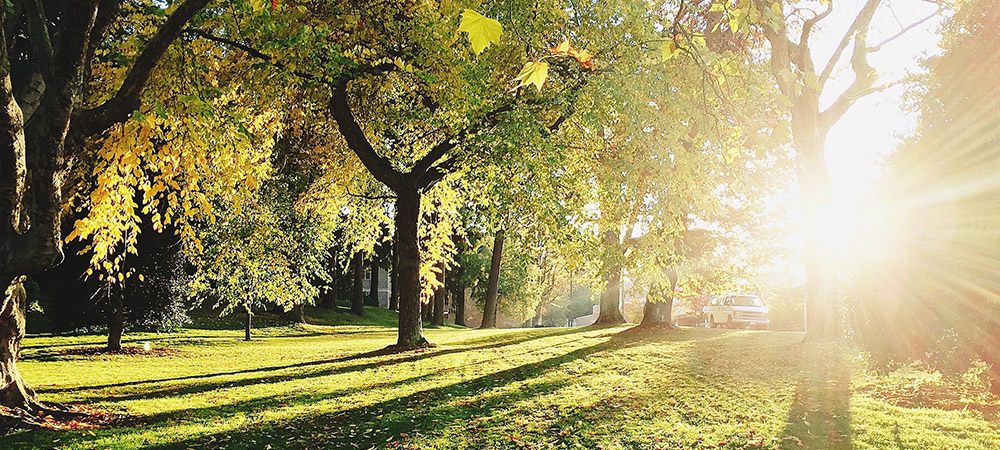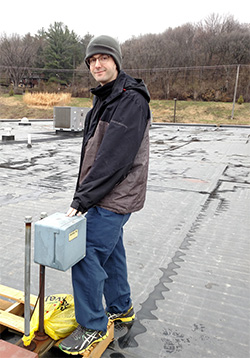The man behind the pollen counts

Ready or not, here he comes
As the daily pollen counts begin to take center stage for another allergy season, we thank those whose task it is to do the painstaking work of collecting, counting, and reporting what’s in the air so allergy sufferers can plan accordingly.
 Tony Kavanaugh, Reference Laboratory Manager for Allergy Associates of La Crosse and Allergychoices, is one of those people. Tony was passed the pollen-counting baton from Allergy Associates of La Crosse Physician Assistant, George Fulford, ten years ago after receiving his training from the National Allergy Bureau (NAB). The La Crosse/Onalaska station is one of 70 certified pollen-counting stations in the U.S. , each of which reports its data to the NAB, which in turn disburses counts throughout the country.
Tony Kavanaugh, Reference Laboratory Manager for Allergy Associates of La Crosse and Allergychoices, is one of those people. Tony was passed the pollen-counting baton from Allergy Associates of La Crosse Physician Assistant, George Fulford, ten years ago after receiving his training from the National Allergy Bureau (NAB). The La Crosse/Onalaska station is one of 70 certified pollen-counting stations in the U.S. , each of which reports its data to the NAB, which in turn disburses counts throughout the country.
Tony’s report is based on counts he performs from a special air sampler which traps pollen over a 24-hour period. He gathers the samples each morning from a rooftop vista, views pollens under a microscope, and literally counts various types of pollens using a mechanical counter. Through his training, Tony learned the equipment, pollen and fungal spore aerobiology, and how to convert counts to concentrations and to identify key pollens.
Conducting the counts, as well as forecasting over weekends based on pollen data and weather, enable him to report in actuals as well as give an early alert to upcoming increases and decreases in various pollen forecasts. The weather, he’s learned, plays a vital role in what’s to come. Rain can dampen down pollens, causing variations from high to low from day to day. “Both day-to-day weather and season-to-season weather impact counts,” notes Tony. “A harsh winter can reduce the tree pollen load for the next spring because the tree buds were damaged. If winter is long and spring is short, everything can bloom at once.” And that’s when allergy sufferers take special notice.
Through the decade of sampling and analysis, Tony has seen other forces impact counts, including an earlier and longer ragweed season, as well as the reduction in pollen counts for certain species. With the recent emerald ash borer infestation decimating the ash tree population, he’s noticing reductions in ash tree pollen.
 Even after ten years of being the keeper of the pollen counts for the La Crosse area station, Tony continues to be enthused to deliver his daily counts. He’s also amazed by nature and its forces – like wind – that enable pollen to reach its intended recipients – receptive flowers. “I enjoy the massive and microscopic scale,” he says. “Pollens are small. Most of the pollen in recent air samples is about 30 microns in diameter or about three times larger than a red blood cell. Tiny pollen can travel a large distance in the air. I find it amazing that pollen can survive. Pollen grains are very tough because of a resistant layer outside the cell wall called the exine. The exine protects the nucleus from physical damage and drying during transport.”
Even after ten years of being the keeper of the pollen counts for the La Crosse area station, Tony continues to be enthused to deliver his daily counts. He’s also amazed by nature and its forces – like wind – that enable pollen to reach its intended recipients – receptive flowers. “I enjoy the massive and microscopic scale,” he says. “Pollens are small. Most of the pollen in recent air samples is about 30 microns in diameter or about three times larger than a red blood cell. Tiny pollen can travel a large distance in the air. I find it amazing that pollen can survive. Pollen grains are very tough because of a resistant layer outside the cell wall called the exine. The exine protects the nucleus from physical damage and drying during transport.”
You can find Tony’s pollen counts and forecasts on lacrosseallergy.com, and through various area media who receive Tony’s updates and insights. And if you happen to be one of those who suffer the consequences of the high counts, we can help you get connected to those who can help make getting through the next pollen season a breeze.
Author: Anne Hendrickson
